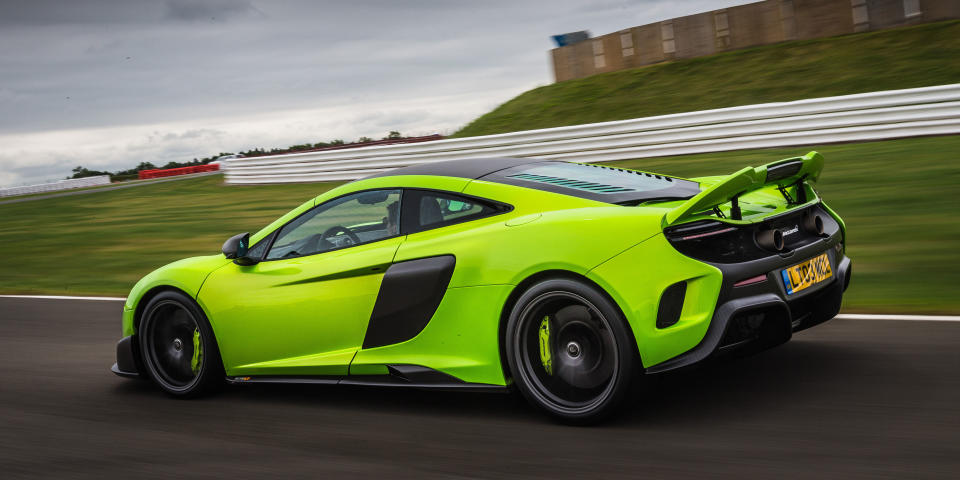Apple Isn't Buying McLaren for Its Supercars

Earlier today, news came screaming across the wires indicating that Apple was interested in perhaps purchasing McLaren. It's a surprising, if so far unconfirmed, bit of news: Apple has long been rumored to have an interested in developing some type of futuristic vehicle. A potential collaboration with McLaren would pair the most powerful tech company in the world with the automaker responsible for some of today's greatest supercars and hypercars.
But that's not quite what's going on here. Financial Times reports that Apple is kicking the tires on McLaren Technology Group, the parent company of McLaren Automotive. And when you take a closer look at what McLaren Technology does, it's apparent that Apple isn't interested in the supercar side of the business.
It's helpful to understand everything that McLaren Technology Group currently controls. The conglomerate, the third-largest business in the United Kingdom by revenue, oversees McLaren Racing (home of Formula 1 operations), McLaren Automotive (builder of road-going cars), and, uh, the catering company Absolute Taste (founded to provide catering to McLaren VIPs and 55-percent owned by McLaren boss Ron Dennis).
The conglomerate also oversees McLaren Applied Technology, a separate subsidiary founded by Ron Dennis in 2004. Unlike the other McLaren subsidiaries, which focus on automotive applications, McLaren Applied Technology is a do-anything engineering consultancy.
Literally, anything. Founded in 2004 by Dennis, McLaren Applied Technology has helped industry giants in a wide variety of segments revolutionize how they design and build their products. A fantastic Wired article from 2015 explains how McLaren Applied Technology helped pharmaceutical giant GlaxoSmithKline completely revamp the production flow of a toothpaste factory in Maidenhead, England, the largest such facility in all of Europe. The result? A 20-million tube increase in annual toothpaste production, accomplished by analyzing production methods the same way the racing team watched Formula 1 pit stops. "If I can change four tires on a car in two seconds," McLaren Applied Technology's Geoff McGrath told Wired in 2015, "why does it take me two hours to do a changeover in the toothpaste factory?"
That clean-sheet, data-first approach has helped McLaren Applied Technology bring major innovations to other non-automotive industries. A collaboration with bicycle maker Specialized saw McLaren strapping F1-style force and vibration sensors to a bicycle frame, gathering data at a level never attempted by the cycle company. The result? A frame that weighed 20 percent less than Specialized's best, with the same rigidity. The bike began winning championships that same year.
Subsequent McLaren collaborations have pushed even further away from the automotive realm. The technology firm used F1 telemetry knowledge to develop wearable devices to monitor the health and healing progress of stroke victims and amyotrophic lateral sclerosis patients; advanced simulation capabilities first developed to test F1 strategies helped McLaren devise a new scheduling system to minimize flight delays at London's Heathrow Airport. Other collaborations with oil and gas drilling companies, data services, sports equipment manufacturers, and medical device producers.
With such a wide-ranging portfolio and deep data and engineering capabilities, it's no wonder that McLaren Applied Technology could be of potential interest to Apple. The California tech giant is best known for revolutionizing existing consumer electronics devices (like the smartphone and the MP3 player) through innovative design and unconventional user interfaces.
If Apple has an interest in McLaren, it's not for the company's twin-turbo engines, 903-hp hybrid drivetrains, or active aerodynamics. A niche British automaker with a goal of producing just 4000 cars in 2017 is not the kind of partner Apple needs to launch large-scale production of a mainstream vehicle.
But an engineering consultant that uses the data knowledge of an F1 team to revolutionize products as varied as bicycles and toothpaste? That fits very nicely with the ethos of Apple, the company that once proudly trumpeted the slogan, "Think Different."
In other words, Apple probably isn't interested in cramming its rudimentary self-driving software into the 650S; it's unlikely that the Cupertino tech company wants to replace the 570GT's steering wheel with an iPhone home button. Hell, it's very much possible that Apple wants McLaren's input on a whole slate of products that have nothing to do with cars.
As of right now, McLaren denies that any such conversations are happening. "McLaren is not in discussion with Apple in respect of any potential investment," a spokesperson told Road & Track; Apple, as always, declined to comment.
The Financial Times stands by its reporting, however. "Apple's interest in the Woking-based company centers on its technology, engineering prowess and patent portfolio," the newspaper says, citing three unnamed sources within the company.
Those sources told the Financial Times that it's "unclear if a deal would go ahead following a recent shift in Apple's car strategy." But if Apple is indeed interested in entering the automotive market-whether through an advanced, autonomous, zero-emissions vehicle or something else entirely-there's likely no better partner than McLaren. Just don't expect the Apple Car to have P1 level performance.
You Might Also Like

 Yahoo Autos
Yahoo Autos 